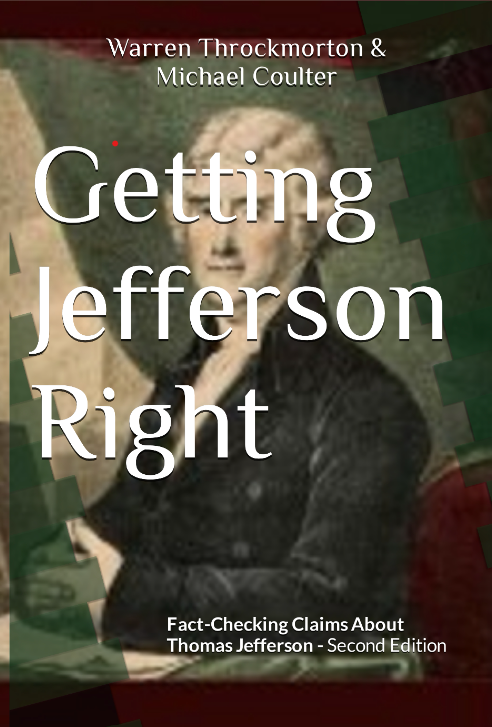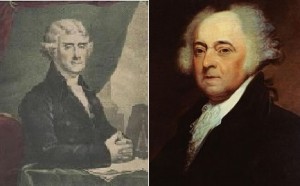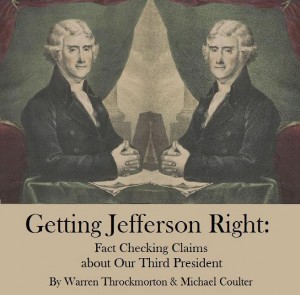On November 1, 2023, the second edition of Getting Jefferson Right: Fact-Check Claims About Thomas Jefferson by Warren Throckmorton and Michael Coulter will be available on Amazon.com and via retailers who order it through Amazon distribution.
As of today (October 27), you can pre-order the e-book on Amazon.com. The paperback and hardback versions will come out on November 1.
Endorsements:
In Getting Jefferson Right, Coulter and Throckmorton prove beyond doubt that Barton is no more scrupulous about the facts of American history than the “revisionists” whose work he pretends to correct. The authors have performed a valuable service.
-Alan Pell Crawford, Author of Twilight at Monticello: The Final Years of Thomas Jefferson
As a historian, reading Getting Jefferson Right consistently elicits in me a dual response: the first is a deep appreciation for the careful, objective and thorough scholarship of Coulter and Throckmorton; the second is incredulous outrage at the numerous historical distortions, misreadings, and outright falsehoods they labor to debunk. Based in a thorough and careful analysis of primary sources in their full context, Getting Jefferson Right is an essential volume for understanding Jefferson in all his complexity, and a robust defense of historical truth against the propagandists who twist the past to serve their agenda.
-Aaron Cowan, Associate Professor of History, Slippery Rock University and author of A Nice Place to Visit: Tourism and Urban Revitalization in the Postwar Rustbelt
Getting Jefferson Right by Warren Throckmorton and Michael Coulter stands up for truth in scholarship against the scholarly problems found in David Barton’s ‘The Jefferson’s Lies.’ Because of the courage of Throckmorton and Coulter, Barton has regrettably fallen from his pedestal of preeminence as a scholar of the early American era. Throckmorton and Coulter deserve the ‘Medal of Honor’ for courage and probity.
-Chuck Dunn, Professor Emeritus of Government, Regent University and author and/or editor of 20 books on American politics, including The Seven Laws of Presidential Leadership and American Culture in Peril.
Ideologues and demagogues are working harder than ever to control how the story of our history is told. We cannot even speak to each other effectively, much less find common ground, if each of us lives in our own little self-created universe where we can make anything up and refuse to be held accountable to the actual historical record. Careful and responsible investigations, focused above all on getting the facts right, are indispensable to any effort to resist the siren songs of extremism. Getting Jefferson Right helps us get Jefferson right, and by doing so, helps Americans of all persuasions understand both themselves and one another more clearly.
– Greg Forster, Senior Fellow and Affiliate Professor of Biblical and Systematic Theology at Trinity Evangelical Divinity School in Deerfield, IL and president of the Karam Fellowship.
This timely second edition of Getting Jefferson Right addresses a new wave of alt-Right Christian nationalists who get Jefferson wrong by downplaying his secular contribution to the rise of religious freedom in America. Yet again, Warren Throckmorton and Michael Coulter separate Jefferson fact from fiction in an eminently readable book that belongs on the shelf of any serious student of early American history.
-Paul Matzko, Historian and Research Fellow at the Cato Institute
In Getting Jefferson Right, Throckmorton and Coulter provide a valuable public service to readers in at least two important respects. First, they expose some of the tactics increasingly employed by so-called Christian leaders to obfuscate and manipulate the facts of the past to advance various social and political agendas. And second, they supply us with a model of patient, nuanced truth-seeking that should be the unwavering standard of every historian and of every Christian.
-Jay Green, Professor of History, Covenant College, and author of Christian Historiography: Five Rival Versions.
I cannot overemphasize the importance of reading Getting Jefferson Right, by Warren Throckmorton and Michael Coulter. It is a point-counterpoint to David Barton’s aptly titled, The Jefferson Lies; and it corrects every myth that Barton presents. Every evangelical pastor in America, especially African-American pastors, needs to not only read, but also study the facts in Getting Jefferson Right.
-Ray McMillian, President, Race to Unity
In Getting Jefferson Right, professors Throckmorton and Coulter offer a thoroughgoing effort to understand our third president in all of his human complexity. In their avoidance of special pleading and their pursuit of scholarly integrity, Throckmorton and Coulter serve both the living and the dead. For the living, they advance the field of early US history and help clarify the lines of Christian orthodoxy. For the dead, they honor Jefferson’s humanity by dealing with him honestly. Honor and soundness are the results of their labors.
-John D. Wilsey, Associate Professor of History and Philosophy at Southern Baptist Theological Seminary and author of American Exceptionalism and Civil Religion: Reassessing the History of an Idea.
Getting Jefferson Right is an intellectual and historical takedown of David Barton’s pseudo-history of Thomas Jefferson by two Christian professors who teach at a conservative Christian college. Michael Coulter and Warren Throckmorton have done their homework. Anyone who reads this book must come to grips with the untruths and suspect historical interpretations that Barton regularly peddles in his books, speaking engagements, and on his radio program. I have yet to read a more thorough refutation of Barton’s claims.
–John Fea, Chair of the History Department, Messiah College and author of Was America Founded as a Christian Nation?: A Historical Introduction
As a pastor and historian, Getting Jefferson Right has been my go-to recommendation when asked the dreaded question, “what is your take on David Barton?” Throckmorton and Coulter judiciously provide evidence and historical context to place Thomas Jefferson in his era, rather than the version of Jefferson that conveniently fits ideological commitments held by Barton. Instead of hot takes with bullet points, Throckmorton and Coulter spend time with the evidence and help the reader to better understand one of our most interesting Founding Fathers. Furthermore, this new edition considers the rise of white Christian Nationalism over the past five years. This updated text includes ways Christian Nationalists mishandle and misinterpret Jefferson. I will continue to recommend Getting Jefferson Right and am grateful for this new edition.
-Rev. Dr. Bobby Griffith Jr., Sr. Minister, Westfield Presbyterian Church, Faculty, Flourish Institute of Theology
Getting Jefferson Right is an excellent example of the art of historical contextualization, of trying to tell the whole story, not just part of it. For those reasons, the work should become a standard reference.
-Paul Harvey, Professor of History, University of Colorado
Jefferson’s legacy as an imperfect, complex figure cuts against the demi-god status some erroneously confer on our Founding Fathers. In Getting Jefferson Right, Throckmorton and Coulter demonstrate in exquisite, painstaking detail how an honest recount of Jefferson’s imperfections not only serves as a reliable basis for historical and cultural analysis, but also how Jefferson — like the American experiment itself — was unfinished and evolving, amending and reforming, to hew more closely to ideals often disappointed by the Founders.
-Daniel Hanson, Founder of LTZF Capital Management and Senior Fellow, American Enterprise Institute
Getting Jefferson Right is a great book for pastors to study. Today we continue to have debates on Christian nationalism and right-wing revisionist history. Many of our church members are exposed to these issues through the Internet and Christian mass media. Pastors need to be up to date on these matters, and this book gives excellent rebuttals based on genuine historical research and facts to counter what David Barton and others claim as support for their assertions on American history and the evangelical church’s role in it. Disinformation is real and Throckmorton’s and Coulter’s work brings true historical research to dispel it. I highly recommend it for pastors so that they can help members discern truth from intentional disinformation.
-Eli Garza, Former pastor, First Spanish Baptist Church, Detroit, MI
Thomas Jefferson is one of the most revered Presidents in U.S. history; and also one of the most misunderstood. In Getting Jefferson Right, Throckmorton and Coulter confront some of the biggest myths with objective facts. The result is a provocative and informative book that has something to teach everyone.
-Jonathan Merritt, author of Learning to Speak God from Scratch, and A Faith of Our Own: Following Jesus Beyond the Culture Wars
As Christian Nationalism continues to rise in the American Evangelical church, so does the spread of misinformation and revisionist history regarding the founding fathers. Getting Jefferson Right is a thoughtful, well researched resource for anyone seeking to discern historical fact from politicized fiction.
-Rev. Caleb E. Campbell, author of Disarming Leviathan: Loving Your Christian Nationalist Neighbors
In Getting Jefferson Right, Throckmorton and Coulter plead for good historical thinking because “history done right will lead to an accurate account.” The historian’s job, regardless of religious persuasion, is to tell the truth, not making a case for a client but rather making an account of the evidence from the past. Through their examination of Christian nationalists’ historical claims, Throckmorton and Coulter exhibit sound historical reasoning. They test the conclusions of historians as they consider the full context of the events and people. Their work continues to be necessary as the battle for telling the truth about the American past continues with assaults from all sides. Letting go of current political agendas and allowing the evidence from the past to speak reveals a powerful story of how the United States has changed over time.
– Brenda Thompson Schoolfield, professor and chair of history, government, & social science at Bob Jones University
Warren Throckmorton and Michael Coulter offer a valuable contribution to Jefferson scholarship and a needed correction to historical revisionism in their second edition of “Getting Jefferson Right.” They expand their critique of Christian nationalist revisionists like David Barton and offer valuable resources for placing Thomas Jefferson firmly in his historical and cultural context. With so many political and cultural forces working to distort historical understanding for their own ends, Throckmorton and Coulter model historical research as it should be done with careful consideration for what the primary sources say on their own terms before making conclusions about contemporary issues. The book is accessible for general audiences while still resting on a foundation of rigorous research that is clearly documented in extensive notes and primary source engagement.
-K. Scott Culpepper, professor of history at Dordt University and author of Francis Johnson and the English Separatist Influence: The Bishop of Brownism’s Life, Writings, and Controversies



